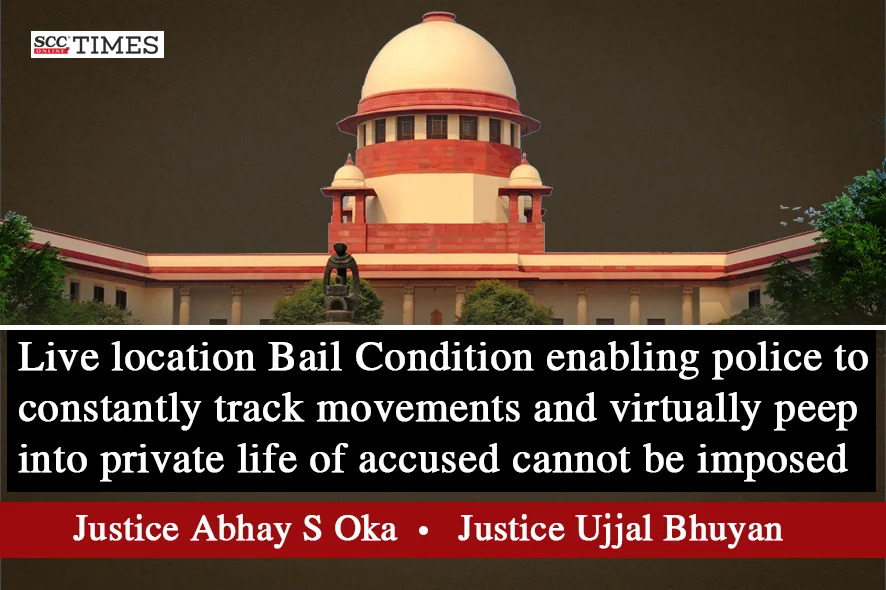Supreme Court: In a special leave to appeal against the Delhi High Court’s decision imposing condition for granting interim bail to a Nigerian national, accused under the Narcotic Drugs and Psychotropic Substances Act, 1985 (‘NDPS Act’), the Division Bench of Abhay S Oka* and Ujjal Bhuyan, JJ. while examining that whether a bail condition requiring an accused to share Google Maps pin with the investigating officer to access his location violates right to privacy, said that there can’t be a bail condition enabling the police to constantly track the movement of the accused on bail.
Background
The Nigerian National was accused of the offences punishable under Sections 8, 22, 23, and 29 of the NDPS Act and was arrested on 21-05-2014. In the matter at hand, two issues were raised regarding the bail conditions, one, as to obtaining the assurance from the High Commission of Nigeria that the accused shall not leave the country and shall appear before the Special Judge as and when required, and the second is of the condition regarding dropping a PIN on Google Map to ensure that their location is available to the Investigation Officer of the case. The issue in the matter at hand, was that whether this condition will offend rights of the accused under Article 21 of the Constitution of India. In one of the previous orders, the Court viewed that such onerous condition, as to assurance from the Embassy, cannot be put as no Embassy will be able to give such an assurance.
Analysis
“Bail conditions cannot be so onerous as to frustrate the order of bail itself.”
The Court perused Section 37 of the NDPS Act and said that the Court’s power to grant bail is constrained by Section 37(1)(b)(ii), however, once a case is made out for a grant of bail in accordance with Section 37, the conditions of bail will have to be in terms of Section 437(3) of the Code of Criminal Procedure, 1973 (‘CrPC’), as Section 52 of the NDPS Act, the provisions of the CrPC apply to the arrests made under the NDPS Act insofar as they are not inconsistent with the NDPS Act.
Regarding the bail conditions imposed, the Court relied on Kunal Kumar Tiwari v. State of Bihar, (2018) 16 SCC 74 and reiterated that the conditions cannot be arbitrary, fanciful or extend beyond the ends of the provision. The phrase “interest of justice” under Section 437(3)(c) means “good administration of justice” or “advancing the trial process” and inclusion of broader meaning should be shunned because of purposive interpretation”. The Court said that while imposing bail conditions, the Constitutional rights of an accused, who is released on bail, can be curtailed only the minimum extent required.
Condition of dropping Pin on Google Map
In respect of the sharing of Google Maps Pin, the Court said that the Court may impose a condition restraining an accused from entering a particular area to protect the prosecution witnesses or the victims but cannot impose a condition on the accused to keep the Police constantly informed about his movement from one place to another. The Court stated that “the object of the bail condition cannot be to keep a constant vigil on the movements of the accused enlarged on bail. The investigating agency cannot be permitted to continuously peep into the private life of the accused enlarged on bail, by imposing arbitrary conditions since that will violate the right of privacy of the accused, as guaranteed by Article 21.” The Court added that if a constant vigil is kept on every movement of the accused, by the use of technology or otherwise, it will infringe the rights of the accused guaranteed under Article 21, including the right to privacy, as keeping such constant vigil on the accused by imposing drastic bail conditions will amount to keeping the accused in some kind of confinement even after he is released on bail. Hence, the Court held that such a condition cannot be imposed on bail.
Therefore, the Court deleted the said condition.
Condition of furnishing certificate of the Embassy
The Court referred to Supreme Court Legal Aid Committee (Representing Undertrial Prisoners) v. Union of India, (1994) 6 SCC 731, which was relied upon by the High Court, and said that the directions in the said case, were to be applicable only one-time and it is not necessary that in every case where bail is granted to an accused in an NDPS case who is a foreign national on the ground of long incarceration of more than 50% of the minimum sentence, the condition of obtaining a ‘certificate of assurance’ from the Embassy/High Commission should be incorporated. Further, the Court elaborated that grant of such a certificate by the Embassy/High Commission is beyond the control of the accused to whom bail is granted. Therefore, when the Embassy/High Commission does not grant such a certificate within a reasonable time, the accused, who is otherwise held entitled to bail, cannot be denied bail on the ground that such a condition, which is impossible for the accused to comply with, has not been complied with. Hence, the Court will have to delete the condition. However, the Courts must remember that the accused has no right to compel the Embassy/High Commission to issue such a certificate. In such a case, instead of the condition of obtaining such a certificate, the condition of surrendering the passport and regularly reporting to the local police station/Trial Court can always be imposed, depending upon the facts of each case.
Conclusion
The Bench set aside the two bail conditions. The Court also viewed that it is not necessary to refer the case to a larger Bench for reconsideration of condition that “where an undertrial accused is charged for the commission of an offence punishable under Sections 31 and 31-A of the Act, such an undertrial shall not be entitled to be released on bail by virtue of this order” laid down in Supreme Court Legal Aid Committee (supra).
CASE DETAILS
|
Citation: Appellants : Respondents : |
Advocates who appeared in this case For the Petitioners: For the Respondents: |
CORAM :











